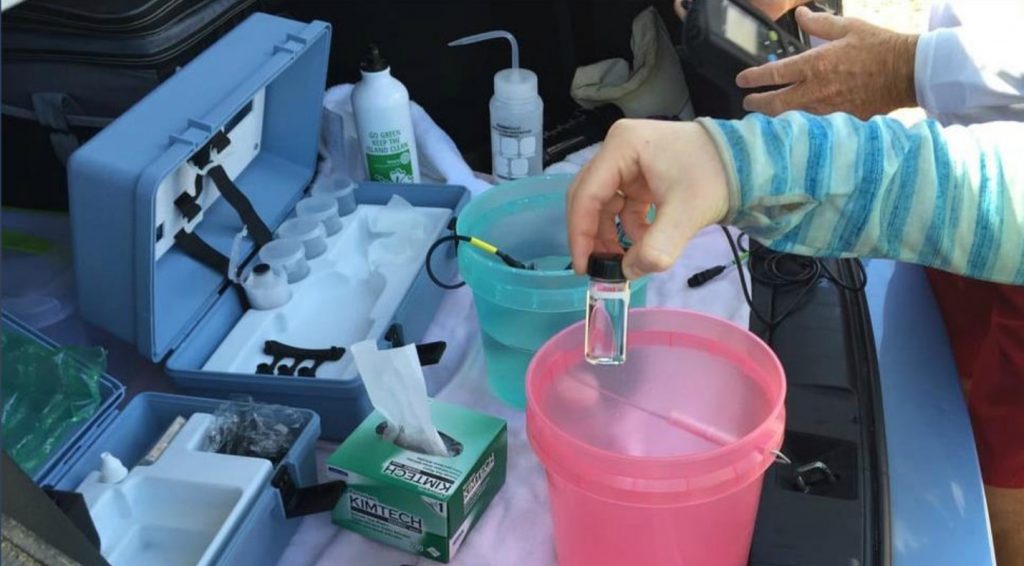Land-based Impacts
Reducing land-based impacts is an important strategy to protect coral reefs and the communities that depend upon them. Appropriate land use practices are critical for the management of watersheds to ensure that the transport of sediment, nutrients, and other pollutants to coral reefs is minimized. Engaging in watershed management strategies and watershed planning is a crucial responsibility for coral reef managers.
The development of a watershed management plan requires coordination with interested partners (local government and NGOs) and stakeholders including public and private groups and community members. Plans are usually comprised of a shared vision and a suite of strategies to address issues identified for improvement through a participatory planning process. Coral reef managers can also engage directly with watershed users by supporting specific strategies that are priorities for coral reef health.

The Hui O Ka Wai Ola (Association Of The Living Waters) citizen science water quality sampling program measures coastal waters for pollutants that can harm coral reefs and human health in Hawai‘i. Samples and data collected are used for decision making around water quality standards and management plans. Photo © Bill Rathfon
The major types of strategies that coral reef managers may get involved in to reduce watershed impacts on coral reefs include:
- Erosion/sediment reduction — Coral reef managers can raise awareness about the implications to marine ecosystems of excess sediments entering watercourses. A range of strategies are available to reduce erosion in both agricultural and urban settings, including revegetation of riparian (streamside) areas, contour tilling, terracing, rotational grazing/cropping, avoiding overstocking, vegetated swales, road drainage and sediment traps (settlement ponds, wetlands, etc.). Planning and design that maintains the natural hydrologic regime can avoid many erosion problems.
- Sewage and stormwater management — Point sources of pollution can be an obvious source of stress for marine ecosystems. While sometimes expensive, technically feasible measures for reducing impacts from sewage and storm water are readily available. Effective and well-managed sewage treatment plants can neutralize or divert many harmful constituents to landfills, while settlement ponds and biological filters (such as wetlands) can greatly reduce the loads of harmful substances discharged with storm water. In some instances, extending discharge points further offshore or into deeper water can reduce local impacts through greater dilution. Where there are no centralized treatment services, councils and homeowners can be assisted/encouraged to maintain septic systems and convert cesspools to septic systems whenever possible. The Bonaire case study provides an example of this watershed strategy.
- Reducing chemical inputs from agriculture — Excess fertilizers entering watercourses can lead to harmful impacts on coastal water quality, and also reduce the profitability of farms. Coral reef mangers can help watershed managers work with landholders to understand the financial and economic implications of inefficient fertilizer use and provide guidance on optimal fertilizer types and application techniques. Reef managers can also help watershed managers understand the downstream implications of different herbicides and pesticides, some of which can be very harmful to marine and aquatic environments and/or can be very persistent. In many countries there are strict regulations on the use of agricultural chemicals that can harm the environment (such as DDT and dieldrin), and reef managers can help raise awareness about regulatory options in countries where harmful chemicals are still used.
- Community engagement — Local communities and reef users (fishers, tourism operators, etc.) are important beneficiaries of efforts to reduce stresses on coral reefs, and can be valuable partners in efforts to influence watershed management decisions. Coral reef managers can increase the constituency for improved land watershed management through outreach and education programs targeting reef stakeholders. Monitoring programs or participatory management activities (such as catchment cleanup days or ‘adopt-a-reef’ programs) that involve community members are a great way to engage stakeholders and create a sense of stewardship. Reef stakeholders are usually also watershed inhabitants, so helping local people understand the links between their actions on land and outcomes for reefs can be a powerful way of reducing local land-based sources of pollution.
Resources
Catchment Management and Coral Reef Conservation: A Practical Guide for Coastal Resource Managers
US EPA Handbook for Developing Watershed Plans to Restore and Protect Our Waters
Cambios en la Línea de Costa de Cabo del Este, Baja California Sur, México
Coral Reef Resilience Online Course, Lesson 6: Management Strategies for Resilience
